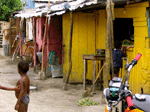Dominican Republic
| Source: . Published on Mon, 2013-04-01 00:00 |
|
Para acabar con la pobreza, las autoridades de República Dominicana deben impulsar un reparto equitativo de la riqueza, ampliar y mejorar la calidad de la educación, la salud, el empleo y la seguridad social, e implementar políticas en beneficio de los más vulnerables. El Plan Estratégico Nacional de Desarrollo aprobado para los próximos dos decenios son una buena herramienta en ese sentido. Si bien el gobierno que asumió en agosto de 2012 se declara a favor de la inversión social y de políticas de desarrollo humano, su discurso se contradice con la reducción de gastos sociales y el aumento de impuestos que responden a condiciones del Fondo Monetario Internacional.
|
Published on Fri, 2012-12-07 12:55
To put an end to poverty, the authorities in the Dominican Republic must promote the equitable distribution of wealth, broaden and improve the quality of education, health services, employment and social security, and implement policies to help the poorest and most vulnerable people. But, according to civil society organizations in their contribution to the Social Watch Report 2013, the official rhetoric about social investment and human development is contradicting by an economic policy of cutting expenditures and increasing taxes, in accordance with conditions imposed by the International Monetary Fund. |
|
The Dominican Republic is fraught with numerous problems including violence against women and against immigrants from Haiti, the degradation of the environment, and principally inequalities in the education system, all of which make it most unlikely that the Government will be able to bring about sustainable human or economic development in the middle term. There has been progress in some areas, but the country urgently needs more far-reaching social policies that are genuinely geared to the changes needed to ensure a decent future. The country will almost certainly not be able to achieve sustainable development unless the education system is drastically changed to make it more democratic.
|
|
Source: . Published on Wed, 2010-11-10 23:00
|
|
Source: . Published on Tue, 2010-11-09 23:00
» |
SUSCRIBE TO OUR NEWSLETTER






